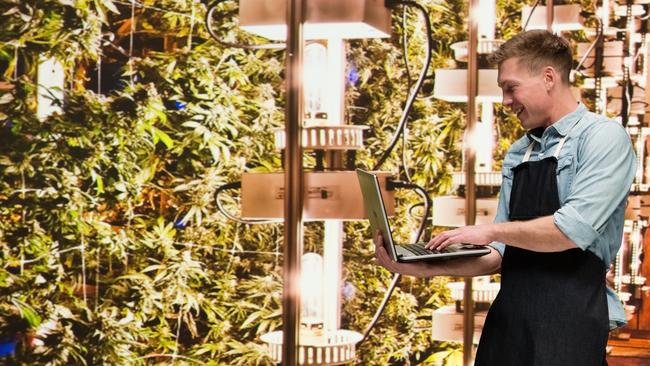Would legal cannabis supercharge SA’s economy? It’s time for a serious debate
Legalising cannabis would be hugely controversial — but the tax revenue could be an economic game-changer for South Australia. Are we ready to follow the lead of the US and Canada?
National
Don't miss out on the headlines from National. Followed categories will be added to My News.
- Lessons from Colorado’s pot-fuelled revenue boom
- Patients speak out: We just don’t want to die in agony
- SA patients struggling to access medicinal cannabis
Should South Australia legalise cannabis?
This is a conversation our politicians aren’t having. But we should be — because it could be an economic game-changer for our state.
Throughout Western countries, surveys show attitudes towards the most widely used illicit drug are shifting fast. Nearly two-thirds of respondents to the Sunday Mail’s Your Say SA survey last year said marijuana use should be decriminalised.
Legalisation is now a mainstream position in the US. Two-thirds of voters support it, along with nearly every Democrat running for president. About half of American states have either legalised or decriminalised recreational marijuana use, and the two earliest movers (Colorado and Washington) generated a combined $A857 million in cannabis tax revenue last year.
Some see parallels in how gay marriage was initially legalised in a few American states and, eventually, federally — then Australian politicians were pressured into a plebiscite that made it the law of the land.
AMERICA’S LAWS
Many analysts think the US will join Canada in fully legalising cannabis within the next decade ... but should we wait to assess the results of this social experiment, or press ahead now?
Advocates say legalisation creates a tax revenue windfall, improves the lives of people suffering chronic pain, and breaks the nexus between casual pot smokers and dealers who peddle hard drugs.
Opponents say cannabis is psychologically addictive for some users, can trigger or worsen mental illness, and legalisation sends a dangerous message to teens and young adults.
So far, with the exception of the ACT which last month passed laws to legalise cannabis for personal use, Liberal and Labor politicians have only been prepared to take baby steps towards giving seriously ill Australians access to medical cannabis.
“Tough on drugs” rhetoric is still the default position — as shown by the Marshall Government’s election pledge to quadruple the maximum possession fine to $2000 and send sniffer dogs into schools.
But consider for a moment the potential economic benefit to South Australia if we became the nation’s first-mover and established an integrated and legal cannabis production and sales industry.
It would create hundreds if not thousands of jobs in production, transport and retail. It would attract entrepreneurs and drive investment. Pot tourists would flock here, injecting additional money into the economy — although probably not the demographics currently sought by SA Tourism (sorry, Old Mate). And then there’s the tax windfall …
The Parliamentary Budget Office in Canberra estimates that national legalisation would raise $3.5 billion in tax over four years. Even if legalisation in SA reaped just one-tenth of that figure, that’s an extra $350 million.
For a state desperately looking for new industries to drive economic prosperity over coming decades, this would be a massive windfall to inject into schools, hospitals and job creation schemes.

No one should pretend such a significant change won’t lead to some problems.
Conflict with federal laws, opposition from Canberra and other states, and condemnation from police are all likely. The stigma of “drug tourism” could damage our attempts to tap into lucrative Asian visitor markets.
Then there’s the social challenges. Cannabis is a mind-altering drug. Some users — particularly teens and young adults whose brains are still developing — are vulnerable to psychiatric disorders triggered or exacerbated by cannabis use.
Driving under the influence, smoking around children, paranoia and decreased motivation are all issues to consider. So too is the broader issue around sending the right messages to our kids about healthy living.
But here’s the point — we already manage these problems with alcohol. That too is a mind-altering drug that causes social problems and, many would argue, more severe health and law enforcement dangers than cannabis.
Several recent studies estimate alcohol kills between 4000 and 6000 Australians a year. But hardly any of us think it should be illegal. For the majority of Australian drinkers, booze is an enjoyable and relatively benign relaxant. We tax it heavily and mitigate the social downsides via education and law enforcement.
Taking a similar approach with cannabis could generate a recurring stream of hundreds of millions of dollars in tax revenue. This would better equip our government to fund education and mental health services to ameliorate these risks, without turning otherwise law-abiding adults into law-breakers.
In just 25 years, the percentage of Americans supporting legalisation of marijuana has soared from 25 per cent to 66 per cent, even though federally it is still a Schedule 1 drug absurdly classed as “more dangerous” than cocaine, methamphetamine and deadly opioids.
Do Aussies feel the same way? The economic opportunity is tempting — for a government that is brave enough to take the initiative and start a serious debate.
AUSTRALIA’S LAWS
Originally published as Would legal cannabis supercharge SA’s economy? It’s time for a serious debate


